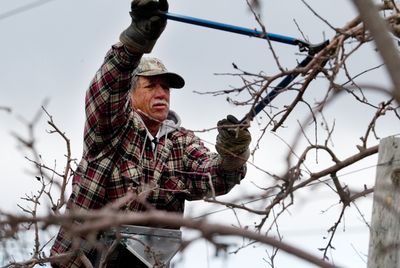Twenty years later, worker glad he chose to be owner

ORONDO, Wash. – Porfirio Covarrubias now believes it was fortunate that he decided to buy his orchard at the worst possible time. He wasn’t so sure in 1989, when the decision first put him $300,000 in debt.
“Apple prices were very bad, but I guess it was better to start at the worst time. Things had to get better,” said Covarrubias, 58. He was one of the first Hispanic orchard workers in the region to graduate to orchard owner. There were great risks involved then as there are now, but Covarrubias is convinced that other farmworkers can succeed.
“If you’re willing to work, anyone can do it. But be careful what you want to buy,” he said. Affordable orchards can be found, especially in Okanogan County, and deals can be made through private contracts with sellers, he said. But he said it’s better to pay more for an orchard in good shape with profitable varieties than to get involved in land that isn’t able to return costs quickly.
Covarrubias emigrated from his native Mexico to work in California’s fields and orchards at age 15. He first came to Washington to pick apples in 1971, working for orchardists in Dryden and Monitor. He met Linda, the woman who became his wife, while picking an orchard in Wenatchee.
Covarrubias remembers spotting a newspaper ad about a new loan program through Farmers Home Administration to help minorities buy farms. His wife laughed when he first asked her to call and investigate the program.
“I thought he was kidding,” she said about his request 20 years ago. It took several calls before the couple got an interview and found out they could qualify if they found an orchard that had potential to pay for itself. They searched for six months, finally settling on the orchard in Orondo where they had worked several seasons.
It wasn’t the most inexpensive orchard, but it was one they thought they could manage and make enough money to pay their mortgage.
The Farmers Home Administration loaned them $200,000 to buy 20 acres of Golden and Red Delicious apples, including a three-bedroom farmhouse and an old warehouse. The property owner, Nolan Carlson, agreed to carry a $100,000 contract for another 10 acres of apples and pears. Covarrubias correctly figured the five acres of pears would help carry him through a few tough years of low apple returns.
The paperwork involved in securing a government loan was difficult, he said. The Covarrubiases were the first Hispanics in the state to take advantage of the minority farm loan program, according to the Farmers Home Administration.
“It was a rough time. We had never done anything like that before,” he said. “It made me nervous to be $300,000 in debt, but I figured I could do the work myself and keep my costs down.”
The couple and their two sons did as much of their own pruning, spraying, thinning, propping and picking as possible for several years. Covarrubias said it took three years to get money flowing so they could start making some improvements.
Returns have improved over the years. Covarubbias was able to replant unprofitable Red Delicious with newer varieties like Gala and Fuji. He also planted a block of cherries that have done very well. The couple built a new house on the property seven years ago.
“I don’t get rich, but we’re very happy. It was one of the best things to happen to me,” he said. “I’m my own boss.”